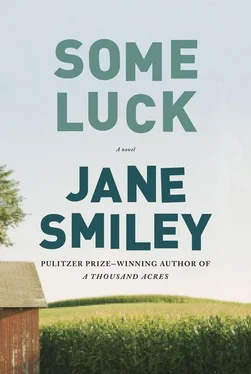“More after the pageant?”
Minnie laughed and poked him in the arm. She said, “You’ll see.”
Well, there was no snow cover yet, which put Papa in a bad mood. After supper and a short Bible reading (lately, they were getting shorter and shorter), he got up and looked out the windows of the front room, as if he could make the clouds come. Each time he sat back down in his chair and picked up his paper or his book, his scowl got deeper. And for once Lillian was fussy. Mama didn’t know why, it looked like. Twice Lillian said “No!”—something Lillian never said. As usual, Joey just sat there. Finally, Frank said, “Mama, you want to hear my song?”
Mama pursed her lips, then said, “Of course, Frankie. I would like to hear your song.”
“What song is that?” said Walter suspiciously.
“His carol for the pageant.”
“That should be harmless, at least,” said Walter. He put down his paper.
Frank stood up and went over to the stove and clasped his hands in front of himself, the way Miss Horton had told him; then he began confidently, “I heard the bells on Christmas day, / Their old familiar carols play, and mild and sweet …” Just there, the same thing happened — there was something about those words, “mild and sweet,” that was delicious and drew him onward. The way the notes seemed to go more deeply into him as they got lower (at “goodwill,” he had to open his throat and chest to get down almost an octave to that note) made him stop seeing his audience. When he was finished, he saw that Mama and Papa were gawking at him. Papa said, “Frankie, you sang that song as if you knew what you were talking about.”
Mama said, “After this year, maybe he does know.”
They exchanged a glance.
“Good boy,” said Lillian.
Mama said, “You know, Opa was a wonderful singer when he was young. He was in a boys’ choir back in Germany that sang for the king.”
“What king?” said Joey.
Mama shrugged. “I don’t know. German kings, who could tell. A Frederick of some sort. Opa had to wear a satin outfit. But when we were children, he sang German songs for us. Then he stopped. I don’t know why.”
“He stopped because of the war,” said Papa.
“Well, yes, of course,” said Mama. “That must be it.” She sighed. But then she reached out and Frankie gave her his hand, and she said, “If you are given great talents, Frankie, you are to use them in the service of the Lord. Do you understand?”
Frankie nodded, of course, but he didn’t understand at all, really.

WALTER WAS DOING a thing that he knew he shouldn’t, but since he didn’t have many animals to take care of for the time being, he couldn’t help himself — he was walking down to the creek just to check how it was flowing. Frankie and Joey were at school, studying about something entirely unrelated to farming, he hoped, and Rosanna was cleaning up after dinner (poached eggs on toast and some fried potatoes). The afternoon was sadly clear and bitter cold, especially brilliant to the west, which was where all things good and bad came from. There was snow, but his boots went right through it. He tried to ignore this.
If you’d asked Walter how many things about the now mercifully passed year of 1930 he’d found shocking, he would have said that nothing shocked him, but that was not true and he knew it. The question was not what was shocking, but what was not shocking. For example, he had been shocked when his corn yield turned out to be thirty-five bushels an acre — the crop had looked so bad that he had expected it to be lower, more like thirty, or less. After ten years of forty to forty-four bushels an acre, maybe he was just spoiled. And then, after the Grahams left, a farm not half a mile away, he and some of the neighbors, hating to see the crop just standing there, had gone to the bank and asked to harvest it and divvy it up. The Grahams got twenty-one bushels to the acre. That shocked everyone, but they didn’t talk about it among themselves — bad luck to do that. Walter could see the Graham house now, and the Graham fields. Walter hurried his steps to get out of the sight of those windows, flat and dark against the brightness of the air. Two on the other side had been broken by someone or something — maybe birds — and Walter had gone over and boarded them up, but that made the place look done for, made you want to peep inside and see the sofa and the dishes they had left behind. Even clothes and shoes.
The oat crop had been worse than the corn crop, more’s the pity for the horses and the cows, but the real shocker was that, with all the news about the drought (and it was worse to the south and the west) that they’d gotten over the radio, through gossip, and in the papers all year, prices had still dropped. How was that? Walter wondered. A bad crop year was supposed to be good for someone, and yet last year, 1930, had been good for no one. Of course, his father laughed. He could afford to laugh — he owned his own farm free and clear — but, more than that, his father always laughed at farming and what a joke it was on the farmer.
Rosanna said, “So — no one can buy food because of the Crash, but does that mean they are just going to let the people starve? Why don’t the churches buy it up? Or some rich people? The food is there, the people need it. Are they going to let it rot in the bins while people starve?” And, irritated, Walter said, “Yes, probably they are, Rosanna.” She found the Grahams’ empty house an abomination for the same reason. She said, “People are roaming the roads and living outdoors in the cold and freezing to death, and that house is sitting empty.” But there was no answer for her that Walter understood well enough to make. She would say, “I gave away my chickens. I even gave away my eggs. Better that they feed someone than get thrown on the trash heap!”
Walter said, “You are a Christian woman, Rosanna.”
So he’d paid his mortgage (just barely) and saved enough seed for the spring (just barely), and they could make it through another year, but what were they going to do for shoes for the children (yes, he had thought of rummaging through the Grahams’ junk) and bits of harness that broke, and how were they going to hire someone to dig the well by the house deeper? For two months now, Rosanna had gotten hardly a drop out of it — Walter and Frank carried water from the well by the barn, which was still producing, though not at the rate it had been. The Graham farm was just a little higher than his, and he suspected that the reason they left had as much to do with the wells as with the crops — that farm had never had as good water as the farms around it.
He also had no sense at all of how things were going to go in the coming year. His hopes had risen right around Thanksgiving with a pretty good snow, maybe six inches, but ice and rain a day later had washed it right away. Then another rain, and he’d felt bleak until, around the middle of December, there’d been five inches, and then another inch and another — a week of snow, until, finally, there were twelve inches on the ground, which made it hard to get to Frank’s pageant, but when they were at the pageant, Walter could not believe the exhilaration all around. When Frank sang his carol, yes, he did a good job, but you would have thought he was Al Jolson, the way all the parents in the audience jumped up and clapped for him. It probably hadn’t been good for Frankie, but Rosanna was happy, and even though you could almost see Frank’s head swelling, Walter had refrained from dampening their pleasure. Well, the snow was still there, hadn’t melted, giving the fields a rest and a promise.
Читать дальше













